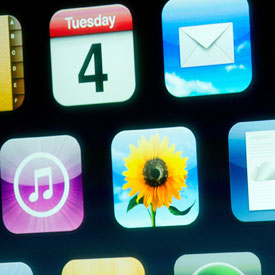Head in the iCloud: Apple stores your data in space
See it, play it, update it. Apple rolls out it’s new operating system, called the i-Cloud – so users can access their data wherever, whenever, they want.

Forget the desktop computer, Apple has just launched a new way of storing everything from digital books, to photographs and music – and the good news is, it’s all free.
The iCloud, as it’s known, is part of the new version of Apple’s operating software, iOS5, that’s been built into all of Apple’s latest products, allowing customers to store all their data and services on Apple’s own servers.
Sync your gadgets
Sign up, and it’ll synchronise everything on all your gadgets – in other words, any Apple device you own will automatically use the latest version of anything you’ve viewed or changed.
And because everything is stored in cyberspace, you won’t need a personal computer at all, whenever you want to get updates of software, see your photographs, browse your contacts, or listen to your playlist.
Download delays
The iOS5 system is available to download free from today – although so many people are trying to get hold of it, it’s taking some users up to five hours to complete the download.
An inconvenient moment, for a system that’s meant to be all about convenience for the customer – and for the tech giant, locking them into its products – if the iCloud actually works according to plan, that is.
There’s nothing new to learn. It just works. Steve Jobs, former Apple CEO
Apple’s previous version, called MobileMe, was less successful, while its launch became dogged by a series of problems, including an 11 day email outage. Frustrated users described it as a “dog’s dinner”.
Soul of Apple’s operating system
The company’s late CEO Steve Jobs, who launched the iCloud service in one of his last public appearances last June, admitted that MobileMe “wasn’t our finest hour”. But he described the new service as the ‘soul’ of Apple’s new operating system – saying “everything just happens automatically, and there’s nothing new to learn. It just works”.
Lessons to learn?
But the lesson of this week’s BlackBerry snafu – with instant messaging and data halted and disrupted for days, could loom large. If anything were to happen to Apple’s servers, leaving users without their personal photographs, or crucial documents, they could well abandon i-Cloud without a second thought. Getting it right, has never been so important.
-
Latest news
-
Windrush scandal: returning to the UK after a forty year wait6m

-
Netanyahu ‘survival’ depends on ‘expanding war’ says head of Palestinian National Initiative5m

-
Proposed law change could strip parental rights from paedophiles5m

-
Hugh Grant settles privacy lawsuit against The Sun newspaper publisher2m

-
Post Office Scandal: what did top executive know?6m

-




